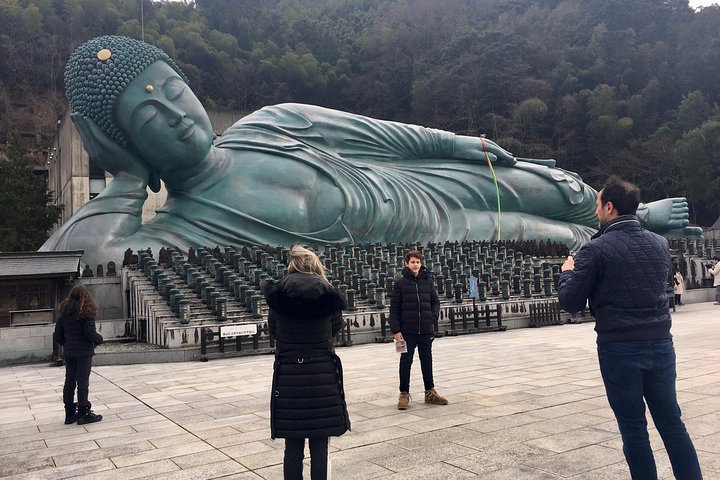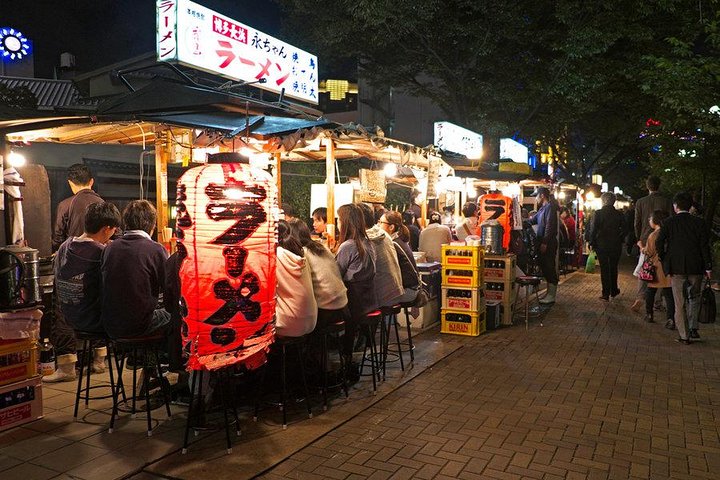Fukuoka Half-Day Private Tour with Government Licensed Guide
» Fukuoka » Fukuoka » Fukuoka
From $111.52
3 reviews (5.00)
Price varies by group size
Lowest Price GuaranteePricing Info: Per Person
Duration: 4 hours
Departs: Fukuoka, Fukuoka
Ticket Type: Mobile or paper ticket accepted
Free cancellation
Overview
This value-packed trip with a government-licensed and experienced multilingual tour guide is a fantastic and efficient way to explore Fukuoka!
Enjoy a Half-day walking tour with your private guide, as he/she introduce modern and traditional aspects of this dynamic, ancient city! This dynamic city is home to many historical temples and is famous for its unique food culture.
Your guide will pick you up at your hotel or any other point at your convenience to start your day. You will then have the choice of visiting any of Fukuoka's famous sites.
Let us know what you would like to experience, and your guide will then arrange a four-hour tour that's best for you!
Note*1: Please select your must-see spots from a list in the tour information to create your customized itinerary.
Note*2: National Government Licensed Guide Interpreter certification is issued by the Japanese government requires a good knowledge and understanding of Japanese culture and history.
What's Included
Customizable Tour of your choice of 2-3 sites from 'What to expect' list
Licensed Local Guide
What's Not Included
Entrance fee (for yourself)
Lunch - Lunch (for yourself)
Other personal expenses
Private Vehicle
Transportation fee (for yourself)
Traveler Information
- INFANT: Age: 0 - 5
- CHILD: Age: 6 - 11
- ADULT: Age: 12 - 99
Additional Info
- Contactless payments for gratuities and add-ons
- Gear/equipment sanitised between use
- Hand sanitiser available to travellers and staff
- Paid stay-at-home policy for staff with symptoms
- Regular temperature checks for staff
- Service animals allowed
- Specialized infant seats are available
- Temperature checks for travellers upon arrival
- Transportation vehicles regularly sanitised
- Contactless payments for gratuities and add-ons
- Gear/equipment sanitised between use
- Hand sanitiser available to travellers and staff
- Paid stay-at-home policy for staff with symptoms
- Regular temperature checks for staff
- Service animals allowed
- Specialized infant seats are available
- Temperature checks for travellers upon arrival
- Transportation vehicles regularly sanitised
Cancellation Policy
For a full refund, cancel at least 24 hours before the scheduled departure time.
- For a full refund, you must cancel at least 24 hours before the experience’s start time.
- If you cancel less than 24 hours before the experience’s start time, the amount you paid will not be refunded.
- This experience requires good weather. If it’s canceled due to poor weather, you’ll be offered a different date or a full refund.
What To Expect
Fukuoka Castle Remains
30 minutes • Admission Ticket Free
Sumiyoshi Shrine
30 minutes • Admission Ticket Free
Kyushu National Museum
30 minutes • Admission Ticket Not Included
Kushida Shrine
was founded in AD 757 and contains many unique features, including exquisite carvings of the Chinese zodiac and a gingko tree said to be more than 1,000 years old. The shrine is also famous for hosting the Hakata Gion Yamakasa each July, a spectacular two-week festival focusing on prayers for good health and prosperity that includes an elaborate race involving teams carrying heavy wooden floats from the temple to various locations around the city.
30 minutes • Admission Ticket Free
Hakata Gion Yamakasa
30 minutes • Admission Ticket Free
Yatai
30 minutes • Admission Ticket Free
Uminonakamichi Seaside Park
30 minutes • Admission Ticket Free
Ohori Park
Ohori is Japanese for moat, and the pond at the center of the park once served as part of the moat system of the neighboring Fukuoka Castle. The park was constructed between 1926 and 1929 and designed after the classical garden style of the West Lake in China. There are three islands in the middle of the pond that are connected to the mainland and each other by elegant stone bridges.
30 minutes • Admission Ticket Free
Shofuku-ji Temple
Before Zen's introduction to Japan, Buddhism has already had a long history in Japan dating back to the 500s. The new teachings of Zen, which Eisai amassed during his travels in China, promoted meditation and discipline as the means to enlightenment and became very popular with the samurai class, which was exerting political power through the shogunate government based in Kamakura.
30 minutes • Admission Ticket Free
Momochi Seaside Park
30 minutes • Admission Ticket Free
Canal City Hakata
Visitors, who are planning on shopping, will likely be able to find something of interest in one of Canal City's many stores, whether it be in a shop unique to Japan or a branch of an international company. There is also a wide variety of restaurants, offering Japanese and international food, that generally have reasonably priced menus. The fifth floor consists of the "Ramen Stadium", which has eight ramen shops with noodle dishes from across Japan, including the local specialty Hakata Ramen.
30 minutes • Admission Ticket Free
Yusentei Park
The park is made up of a beautiful garden which is built in the traditional style as well as an ornate pond and this is a great place to come if you want to get out of the crush of the city.
You can also see a slice of Fukuoka as it would have been in the days of old.
30 minutes • Admission Ticket Not Included
Hakozaki-gu
The original was destroyed when it was set on fire during the Mongolian invasion of Fukuoka in 1274 but it was then rebuilt and has been standing in this spot ever since.
Some of the sights to look out for here include a stone anchor that would have been used by Mongolian ships and a statue of Nichiren, a prominent Buddhist scholar in Fukuoka who foresaw the Mongolian invasion.
30 minutes • Admission Ticket Not Included
Fukuoka Tower
The tower soars to a height of some 234 meters and from here you can look out over the glittering city below.
One of the good things about the tower is that it is lit up at night and it is also one of the national symbols of the city, so it is well worth a visit when you are in town.
Another highlight here is the fact that the tower has a restaurant at the top so you can have lunch or dinner and enjoy the views below.
30 minutes • Admission Ticket Not Included
Nokonoshima Island
To get to the island you can take a relaxing ferry ride which takes around 10 minutes and lets you take in the stunning views across the water at the same time.
There are several islands to choose from but one of the best is Nokonoshima which has a radius of some 12 kilometers and is known for its prime position in Hakata Bay.
If you visit the island you can enjoy activities such as hiking and swimming off the coast, and if you want then you can also set up camp here for the night and enjoy an evening under the stars.
30 minutes • Admission Ticket Free
Atago Jinja Shrine
The shrine is located on a hillside which means that you can also take in sweeping vistas from here all over the city and across to Hakata Bay and you will also be able to see the nesting storks for which this area is famous.
As you approach the shrine you can take in the torii gate which welcomes you and then walk up the stairs to get to the main shrine area.
This shrine is a little off the beaten track compared to other sites in the city but it is more than worth the effort to get here for the views and a glimpse of some of the religious history of the city.
30 minutes • Admission Ticket Free
Itoshima
30 minutes • Admission Ticket Free
Dazaifu Temmangu
30 minutes • Admission Ticket Free
30 minutes • Admission Ticket Free
Yanagibashi Rengo Market
30 minutes • Admission Ticket Free
Nanzoin
30 minutes • Admission Ticket Not Included
« All Activities





















 English (Canada)
English (Canada) Español (Argentina)
Español (Argentina) Español (Chile)
Español (Chile) Español (Colombia)
Español (Colombia) Español (México)
Español (México) Español (Perú)
Español (Perú) Español (Venezuela)
Español (Venezuela) Français (Canada)
Français (Canada) Português (Brasil)
Português (Brasil) English
English Dansk
Dansk Deutsch (Österreich)
Deutsch (Österreich) Deutsch (Schweiz)
Deutsch (Schweiz) Deutsch
Deutsch English (UK)
English (UK) English (Ireland)
English (Ireland) Español
Español Français (Belgique)
Français (Belgique) Français (Suisse)
Français (Suisse) Français
Français Italiano (Svizzera)
Italiano (Svizzera) Italiano
Italiano Nederlands (België)
Nederlands (België) Nederlands
Nederlands Norsk
Norsk Português (Portugal)
Português (Portugal) Svenska
Svenska English (Australia)
English (Australia) English (Hong Kong)
English (Hong Kong) English (India)
English (India) English (Malaysia)
English (Malaysia) English (New Zealand)
English (New Zealand) English (Philippines)
English (Philippines) English (Singapore)
English (Singapore) 日本語
日本語 English (South Africa)
English (South Africa)